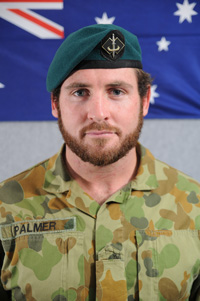Date
February 24, 2013
Tim Barlass
 Soldiers who have served in Afghanistan say the Defence Department is unprepared for the number of servicemen who will return with post-traumatic stress disorder.
Soldiers who have served in Afghanistan say the Defence Department is unprepared for the number of servicemen who will return with post-traumatic stress disorder.
Ray and Pam Palmer, the parents of commando Scott Palmer, who was killed in Afghanistan, are among those who believe the impact will be much higher than Defence’s estimates of about one in 10 serving staff.
Private Palmer was among the first on the scene when his colleague Private Damien Thomlinson drove over an improvised explosive device, which was to claim both his legs.
Mrs Palmer, from the Northern Territory, said she noticed a big change in her son before he returned for his third tour of Afghanistan in 2010. He later died in a Black Hawk helicopter crash.
”He developed a twitch, a sense of nervousness and was reluctant to go out in case a car backfired,” she said.
”The government is not ready for the number of people that are going to come back with PTSD. They think it is going to be a ripple but it is going to be an enormous wave.
”The government should realise they stuffed up with Vietnam; not helping the guys when they came back. Let’s not make the same mistake twice,” she said.
Ian Hickie, of the brain and mind research institute at the University of Sydney, said the estimated rates of PTSD were as accurate as they could be. ”Australia has done one of the best surveys on this in the world; I think probably the best survey. The figures that have come out of that are accurate at this point,” he said.
However, he warned it was impossible to predict if the rates would remain steady.
”The figures only tell us what the situation is now. We can’t predict what they will be in the future. But we do know that [PTSD] is absolutely one of the major injuries of war that affects people for the rest of their lives,” he said.
Warrant Officer Paul Chapman, 44, from Tweed Heads, has been diagnosed with PTSD. ”This is going to blow out of all proportion,” he said. ”At the moment it’s OK but it might take couple of years for PTSD to start kicking in. It’s massive but no one wants to talk about it.”
Australia has 1550 personnel in Afghanistan but that number will not decrease substantially until towards the end of the year.
The Department of Veterans’ Affairs spends about $165 million a year on mental health services.
The Department of Defence finances healthcare while personnel are still in the forces. Between July 2009 and June last year, it spent $65.4 million on mental health.
The issue of how the government handles PTSD was thrown into the open by the former commander of Australia’s forces in the Middle East and Afghanistan, Major-General John Cantwell, who told Parliament recently that ”one in eight will suffer some profound and potentially life-changing influence”.
About 1180 servicemen are being treated for PTSD, including about 800 who served in Timor, where the risks were substantially less than in Afghanistan. ”We have exposed thousands and thousands of young and old Australians to some pretty brutal experiences,” General Cantwell said.
The director general of Defence’s mental health, psychology and rehabilitation branch, David Morton, said: ”We have improved responsiveness to these things because we recognise we will see more people coming through.”
with Sarah-Jane Collins
From ‘kill mode’ to civvy street
Warrant Officer Paul Chapman, a father of two, was providing fire support for artillery in Helmand province, Afghanistan, when a rocket-propelled grenade explosion flung him into a shipping container and knocked him out.
”It was pretty traumatic … I never told anyone about this until I got back home in 2011. I tried to fit back in but I felt like I was excluded from everyone.
”I thought about suicide a few times when I was in my room because I didn’t know what was going on. I developed road rage. I would drive down the shops and I would be abusing people, chasing them down. I was shaking uncontrollably.”
A doctor sent him to a psychologist. ”I am glad someone noticed it because otherwise I don’t think I would be here today. It’s a man’s world in the army, you don’t show any weakness.
”I’m on a lot of medication, heaps of it. [My wife] Lisa took it really hard.
”Me and my
Speak Your Mind